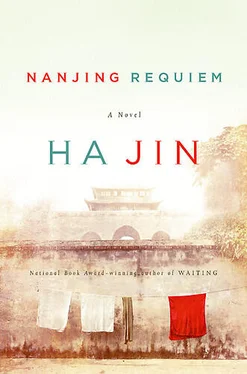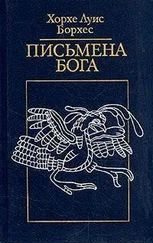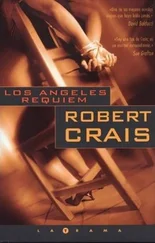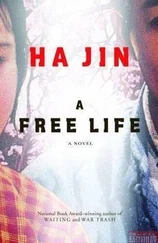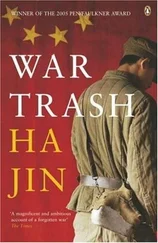As we walked along Zhongzheng Road, the old woman said finally, “Minnie is outrageous. She shouldn’t have indulged in that kind of personality cult.”
“I’m sure she doesn’t like it at all,” I ventured. “Those women embarrassed her.”
“She ought to feel abashed. Nobody alive should be dubbed a goddess.” Her upper lip puckered as she spoke.
I didn’t know how to continue and turned reticent again, feeling uneasy because I hadn’t told Minnie about this downtown trip with Mrs. Dennison. Along the street I noticed that some Japanese stores had closed, perhaps because business was bad — their goods were too expensive and couldn’t be shipped out to the countryside. I’d heard that some Japanese shop owners and restaurateurs had left Nanjing. Many who remained followed the practice common in Manchuria of joining some Chinese as business partners or acting as their protectors or liaisons so as to profit without investing any capital.
We saw a lot of peddlers and small stores, some even selling looted objets d’art — paintings, calligraphy scrolls, marble sculptures, antique bronzes. Mrs. Dennison could not believe her ears when a vendor asked only two yuan for a pair of small Ming vases. She examined the vessels for a long time, turning them this way and that, but finally put them down, perhaps reluctant to let me see her buy purloined things. I told her, “Nowadays only food is expensive.” Indeed, a bony capon sold for two yuan as well.
The area around the Confucius Temple had again become a marketplace, bustling with people, wheelbarrows, panniered donkeys, and carts drawn by animals. On both sides of the streets a number of buildings remained roofless, some with the top stories gone, but shops were open on the ground floors. There were restaurants, grocery stores, teahouses, opium dens, barbershops, pet stores full of birdcages and aquariums, herbal pharmacies, pawnshops, and even a bathhouse. Anywhere you turned, vendors would shout their wares in singsongy voices. At a street corner a clutch of people stood before a wide bulletin board; today’s newspapers had been tacked to it for those who couldn’t afford to buy one. Beyond the board, the narrow Chinhuai River flowed almost invisibly, its greenish water wrinkled a little by a breeze. On the opposite bank, a few middle-aged women were beating laundry on flat rocks with wooden paddles. A red-roofed boat came through a bridge arch, and on it two gentlemen were playing chess while a teenage boy at the stern rowed with a scull.
In a small alley, its entrance decked with two strings of tiny sun-disk flags, I noticed a number of brothels, all on the top floors with balconies, some of which, as the photos on their windows showed, employed women from Japan as well. The Japanese prostitutes, though mostly in their thirties and forties, charged twice as much as the Chinese women doing the same work and fifty percent more than the Korean prostitutes. I’d heard of such places but had not expected to see them here. It was Jimmy Pan, the most active official in the puppet municipality, who’d been instrumental in setting up these bordellos. In private the Chinese often argued about his role in this matter, some saying that Jimmy had done the city a service by finding a way to protect the good honest women, while others maintained that he’d sold his soul to the devil and become the number one traitor here. Personally, I believed he should be punished for helping to set up the brothels. A poster once appeared on the city wall announcing that he would be beheaded as soon as our army came back and retook Nanjing. Jimmy Pan had also been a board member of the former International Relief Committee and was actively involved in charity work. He was one of the few officials whom the foreigners could trust. To be fair, he was at most a smalltime traitor, similar to many of the officials in the municipality; the major traitors were those who had been collaborating with the Japanese to form a national puppet government, which was still in the making. Yet however a traitor, minor or major, might try to justify himself, the Nationalists had issued a clear, indisputable definition of treason: insofar as the enemy’s army occupies the land of China, whoever works for them is a traitor.
By now Mrs. Dennison had recovered from the scene she had witnessed with Minnie, saying, “Amazing, you Chinese can survive anything.”
“Just a year ago,” I said, “everything here lay in ruins. Every house was gutted and had lost its roof, and many were burned down. Who could have imagined that this district would come back to life so soon?” As I was speaking, anger again surged in me. I had lived in Nanjing long enough to consider it my new hometown.
“I guess,” Mrs. Dennison went on, “this city was destroyed time and again in history, so people here must be accustomed to all sorts of devastations.”
“True, that may explain why we can survive a catastrophe like this Japanese occupation.”
The Confucius Temple had been repainted crimson, and even the huge stone lions in front of it and the placards hanging beside its doors had been washed clean. The gateway, with its flying eaves and colored tiles, was decorated with two rows of lanterns, each printed with the character HAPPINESS, below which people hustled to and fro. The Japanese seemed to mean to preserve this shrine and restore its popularity.
We entered a stationery store on the waterside to see if there was something we could buy for the college. The owner, a fleshy-faced man with a hairy mole on the wing of his broad nose, said delightedly, “Welcome to this hovel. President Dennison, I’m so happy to see you back.” He nodded at her, beaming.
“Nanjing’s home,” she said. “I’ve nowhere else to go.”
She was so pleased by his words that she bought a pack of Dearer Than Gold ink sticks.
I knew she couldn’t use a writing brush, so she had probably purchased them as a present.
We took a rickshaw back. When we arrived at Jinling, dinner was already over at the dining hall, so we had chicken noodles at my home. After the meal, we drank pu-erh tea while Liya, who knew English, since she had attended a missionary school, read an article in the North China Daily News out loud. It reported that the Japanese army had just captured Guling, a hill-encircled resort town in Jiangxi Province, where foreigners and Chinese officials used to flock to escape the summer heat, though it was unclear how many men our army had lost this time. The Japanese claimed that they had eliminated all five thousand defenders, but that was unlikely, because the Nationalist troops were already familiar with the Japanese tactics and knew how to avoid annihilation.
Mrs. Dennison thanked me for a wonderful afternoon and evening. I was glad but unsure if this meant she would now treat me better. If Dr. Wu were around, she could mediate between the old president and Minnie, whom she was fond of, but I was only a forewoman and couldn’t possibly perform that function. I just wanted to be on decent terms with Mrs. Dennison. Not only did I need to make sure my family could stay in its safe haven; I also hoped I could calm the old woman if she became upset or angry.
FIVE OF THE SIX IRC men were released from jail on April 27, thanks to an amnesty in honor of Emperor Hirohito, whose thirty-eighth birthday was two days away. Our part-time math teacher was among those released, though one student’s father was still in jail. The returned men had all been instructed not to talk about their ordeal in prison, or else they would be brought in again. One of them had a broken wrist, and another, his face partially paralyzed, could no longer speak coherently. Yet none of them would disclose what had happened to them, and each one just said he was lucky to come back alive.
Читать дальше
